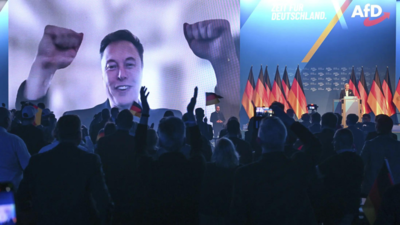Tech billionaire Elon Musk joined a campaign gathering of Germany’s AfD party on Saturday, demonstrating his continued backing before the upcoming elections in the European nation. He called for support to AfD saying that Germany needs to move from the “past guilt”.
Speaking, via a video link, to thousands of AfD supporters gathered in Halle, an eastern German city, Musk declared their party represented “the best hope for the future of Germany”.
During the virtual address, he also stated, “The German people are really an ancient nation which goes back thousand of years”.
In his remarks, he also seemingly mentioned Germany’s Nazi history, stating “children should not be guilty of the sins of their parents, let alone their great grandparents”. Subsequently, he expressed his view that society places excessive emphasis on historical culpability and suggested the need to progress forward from such perspectives. “There is too much focus on past guilt, and we need to move beyond that,” he said.
Musk also addressed the crowd saying, “I even read Julius Caesar was very impressed (by) the German tribes” and encouraged the supporters to “fight, fight, fight” for their nation’s future.
Musk, who maintains strong ties with US President Donald Trump, further called the Germany elections “incredibly important”. “I think it could decide the entire fate of Europe, maybe the fate of the world,” he remarked.
His involvement has prompted concerns from established political leaders, who have criticised his engagement in European political matters through his comments on the social platform X, affecting countries including Germany and Britain. Critics argue that Elon Musk’s involvement in German politics highlights the growing influence of billionaires on democracy. Social Democratic Party’s co-leader Saskia Esken condemned his remarks, saying, “Our democracy is defensible and cannot be bought.”
CDU leader Friedrich Merz pointed out the contradiction in Musk’s claims, noting the AfD’s opposition to Tesla’s Berlin factory.
Chancellor Olaf Scholz also rebuked Musk’s influence attempt, saying decisions will be made by “reasonable and decent people.” Robert Habeck accused Musk of undermining European democracy for personal gain, and President Frank-Walter Steinmeier warned against external interference, calling out Musk’s platform, X.
Meanwhile, Musk has justified his connections with the AfD by claiming their positions are frequently misunderstood, pointing to Alice Weidel’s relationship with her Sri Lankan same-sex partner as evidence.
However, German security services have consistently categorised the AfD as a possible extremist organisation, considering their ideological stances to be harmful.
Musk has voiced his right-wing leanings for Germany previously as well. Earlier this month, Musk had invited c-leader of AfD Alice Weidel to speak on X (formerly Twitter), where he endorsed the party and praised the party’s anti-establishment stance.
This comes amid a week during which the billionaire entrepreneur faced additional scrutiny for displaying a hand gesture at Donald Trump’s inauguration rally speech, that some observers interpreted as reminiscent of a straight-armed Nazi salute. Musk has consistently denied the claims claiming it was a “my heart goes out to you gesture” and drawn parallels to other prominent people claiming they made similar gesture including his predecessor Barack Obama and his rival for 2024 elections Kamala Harris
As for Germany, as Musk lent his support to the right wingers, large crowds of German citizens gathered on the same day to protest against far-right movements. Massive demonstrations occurred in Berlin and Cologne, with police updating attendance numbers to 35,000 and 40,000 respectively. In Berlin, protest organisers stated that 100,000 participants joined the demonstrations in the capital, as reported by AFP.
At the Brandenburg Gate, demonstrators illuminated the area using their mobile phones and displayed letters spelling out “Resistance”.
With Germany’s February 23 elections approaching, AfD has reached unprecedented support levels of approximately 20 per cent, breaking long-standing post-war reservations about backing far-right parties.
The CDU/CSU coalition maintains a leading position with roughly 30 per cent support, whilst CDU’s Friedrich Merz stands as the primary candidate for chancellor in the upcoming elections.




